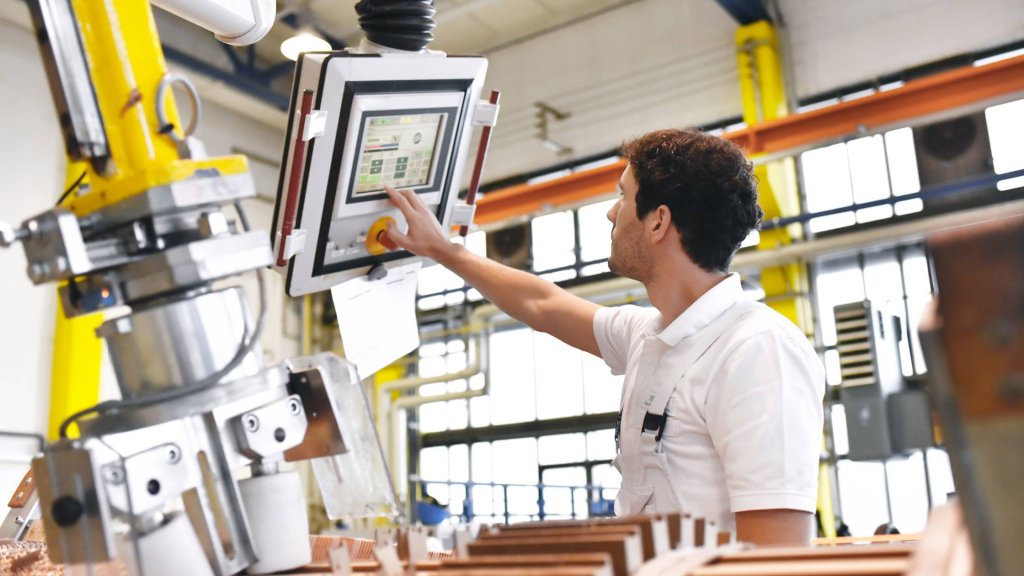VIEW BY TOPIC
- Finding Customers
- Business Systems
- Managing Employees
- Leadership
- Managing Money
Related Posts

Ready to Grow Your Business Fast?
Here’s How I Grew Five Businesses, and Eventually Sold One to a Fortune 500 Company.

Leveraging Technology for Improved Manufacturing Efficiency
The manufacturing industry is undergoing a major transformation, driven by the integration of advanced technologies. This shift goes beyond just speeding up production lines or reducing costs. It involves a strategic use of technology to enhance productivity, improve product quality, and efficiently use resources. Notably, since the beginning of 2022, there’s been a notable 3.5% increase in manufacturing output, highlighting the significant impact of technology in this sector. Manufacturing efficiency is crucial to your success.
This article explores how these technological advancements are reshaping manufacturing efficiency, signaling a future where technology is central to industrial success.
ERP Systems
In the fast-paced and ever-evolving world of manufacturing, the role of technology, particularly ERP systems, is becoming increasingly critical.
For instance, the fashion industry, known for its dynamic nature and constant demand for innovation, requires robust systems to manage its complex operations. The integration of apparel ERP systems serves as a key example of this technological transformation. Offering a range of features tailored to the unique needs of the fashion industry, an apparel ERP system includes multi-channel sales management, extensive inventory control, and efficient integration with various eCommerce platforms.
By leveraging such ERP solutions, manufacturers of all niches can centralize their operations on a cloud platform, facilitating enhanced decision-making and streamlined workflows. This integration not only elevates efficiency but also fosters effective collaboration among different departments, which is crucial in the dynamic and fast-paced world of manufacturing.
Automation and Robotics

Automation and robotics in manufacturing are revolutionizing the industry, especially for small and medium-sized enterprises. These technologies enable high precision in tasks like component assembly and quality checks, enhancing product quality and speeding up the production process. Beyond robotics, automation includes systems for material handling, quality control, and packaging.
This broad scope of automation is critical for small and medium-sized enterprises, allowing them to compete with larger companies. It offers cost savings by reducing labor expenses and minimizing human error, leading to more reliable and consistent manufacturing outcomes. The integration of automation in manufacturing processes signifies a shift toward more efficient, cost-effective, and competitive production capabilities.
Internet of Things Integration
IoT’s integration into manufacturing represents a significant leap in how manufacturers oversee and control their production processes. IoT devices, such as sensors and smart machines, collect data at every stage of the manufacturing process. This data, when analyzed, provides insights into the efficiency of processes, the health of machinery, and even the consumption patterns of raw materials. IoT’s real-time data capabilities enable manufacturers to make quick, informed decisions, greatly enhancing operational efficiency.
Predictive maintenance, a critical aspect of IoT, uses data to predict equipment failures before they occur, thereby minimizing downtime and maintaining continuous production. IoT also supports better supply chain management by providing visibility into every stage of the production process, from raw material sourcing to final product delivery. This level of integration leads to a more responsive, agile manufacturing environment capable of adapting to changing demands and market conditions.
Advanced Data Analytics
In manufacturing, harnessing advanced data analytics is crucial for operational excellence. This approach involves collecting and analyzing vast amounts of data from production processes to uncover inefficiencies and areas for cost reduction.
By doing so, manufacturers can predict maintenance needs, optimize production schedules, and make well-informed decisions that enhance productivity. The use of machine learning and AI in data analytics further enables predictive modeling and process optimization, leading to smarter, more efficient manufacturing processes.
3D Printing and Additive Manufacturing Efficiency
3D printing, evolving beyond prototyping, is now a vital element in manufacturing. This technology allows for quick production runs, offering remarkable levels of customization and design flexibility, which are crucial in today’s market.

It also significantly reduces material waste, aligning with sustainable manufacturing practices. The speed and precision of 3D printing make it indispensable for on-demand manufacturing and for producing complex geometries that traditional methods cannot easily replicate.
Sustainable Manufacturing Technologies
Sustainable manufacturing technologies are increasingly vital in reducing the environmental impact of industrial processes. They encompass energy-efficient machinery, renewable energy sources, and innovative waste reduction methods. Additionally, advancements in materials science are introducing biodegradable and recyclable materials, drastically reducing waste and resource depletion.
These sustainable practices not only conserve natural resources but also enhance a manufacturer’s reputation as an environmentally responsible entity. They also offer long-term cost savings, as energy-efficient operations often result in reduced operational costs.
Conclusion on Manufacturing Efficiency
The evolution of manufacturing through technology is transforming the industry. The increase in manufacturing output showcases the profound effect of advancements like automation, IoT, and data analytics. These technologies are not mere trends but integral components for future-proofing manufacturing operations. They enable manufacturers to stay ahead in a competitive and rapidly changing market.
Embracing these innovations is essential for efficiency and competitiveness. The future of manufacturing is undeniably linked to the adoption and integration of these advanced technologies, making them indispensable for modern manufacturing success.














